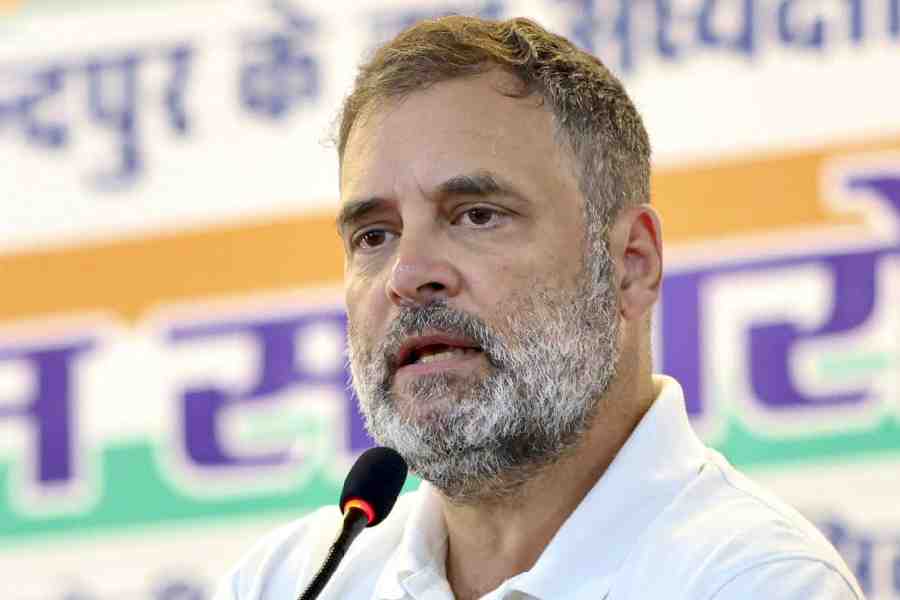Donald Trump’s H-1B visa shock has prompted Opposition politicians to
portray Prime Minister Narendra Modi as “weak” and question his vaunted diplomatic prowess, but India Inc. hoped the return of skilled professionals could work in the country’s favour.
Some, however, suggested that the best Indian workers would stay on in the US or shift to countries like the UK and Australia.
“I repeat, India has a weak PM,” Congress leader Rahul Gandhi posted on X on Saturday.
He shared his tweets, from 2017, of news articles that said H-1B visas had not come up in talks between Modi and Trump (who was President then, too) and that New Delhi had accepted Washington’s use of the term “Indian-administered Jammu and Kashmir” for the then Indian state.
Tagging Modi, Congress president Mallikarjun Kharge posted on X that “Indians are pained by the return gifts you have received after the birthday call” (from Trump on Wednesday).
“…$100,000 annual fee on H-1B visas, hits Indian tech workers the hardest, 70% of H-1B visa holders are Indians,” he added.
Kharge listed some of Trump’s other blows to India.
“50% tariff already imposed, a loss of ₹2.17 lakh crore to India is already estimated in 10 sectors alone. HIRE Act targeting Indian outsourcing. Chabahar port exemption lifted, a loss to our strategic interests,” he posted.
“Even a call for the EU to impose 100% tariff on Indian goods! Mr. Trump again recently claims (for the umpteen time!) that his intervention stopped the India-Pak war.”
Kharge added that national interest was “supreme” in diplomacy and that “Bear Hugs, Hollow Slogans, Concerts and getting people to chant ‘Modi, Modi’ is not Foreign Policy!”
Trinamool MP Mahua Moitra posted: “50% extra tariffs. $100k H-1B visa fee. NaMo’s dosti with Doland proving very expensive for India. Maybe he should make some less costly friends.”
Hyderabad MP Asaduddin Owaisi wrote: “My complaint is not against Trump, he did what he wanted. My quarrel is with this government: what did you achieve with Howdy Modi and Namaste Trump?”
He asked the government to introspect “why India is facing such difficulties in foreign policy and national security” and asked: “Is it because you have reduced these issues
to gimmicks?”
Industry hope
Former Niti Aayog CEO Amitabh Kant regretted the US move but tried to project it as an opportunity for India, saying Trump’s decision would “choke U.S. innovation, and turbocharge India’s”.
“By slamming the door on global talent, America pushes the next wave of labs, patents, innovation and startups to Bangalore and Hyderabad, Pune and Gurgaon,” he said in a post on X.
“India’s finest doctors, engineers, scientists, innovators have an opportunity to contribute to India’s growth & progress towards #ViksitBharat.”
On LinkedIn, Snapdeal co-founder and Wharton alumnus Kunal Bahl said: “It will no doubt be tough in the beginning to move base, but will work out for them given the tremendous opportunities in India.”
Ahmedabad-based entrepreneur Shailesh Pithadia responded to him, saying: “This could be the moment India moves from being a talent exporter to a global innovation hub. The real game will be how quickly organisations here can absorb and challenge this returning talent.”
However, Anurag Saxena, VP-Asia of financial MNC Accion, underscored that the brightest Indian H-1B holders might not return to India.
He replied to Bahl, saying: “The ones who are highly qualified and competent will stay back. Big Tech will retain them. Others will move to UK, Australia and Middle East. A few will be back to India. This decision has negative effect on US as well as India. Such moves kill business and dreams of many!”
Radhika Gupta, MD and CEO of Edelweiss Mutual Fund, said: “I was fortunate to graduate in 2005, when H-1B norms were far more favourable in the US. But things changed quickly in 2008 during the financial crisis — many Indian students felt upset, lost, and stuck.
“Some eventually returned home, and years later, even those of us who still had the visa made the same choice.
“Today, we’ve built fulfilling lives here — with tremendous professional opportunities and the deeper joy of creating in our own country…. And India of 2025 is a far more exciting place than India of 2005 ever was.”
Bengaluru-based venture capitalist Hemant Mohapatra wrote on X: “I was in US for 15 years on H1B, that would have meant a $1.5M fee paid to the gov. While I was working on semicon in US (a critical area, not IT) my salary was <$100k. No way AMD would have hired me.
“I published papers, patents but many of my colleagues were far more prolific in their research and >50% were immigrants. Same is true in bio, space, robotics outside of high paying cities & well funded startups and big tech.”
He said Trump’s move would: “1) Advantage big tech and they’ll concentrate talent and power over others
“2) Lead to higher ‘return to home country’ in short term not just for the average IT worker but many highly skilled PhD sorts; India needs to be ready to give them a career or they move to Australia, UK, etc, or worse, lead unhappy careers. This is really tricky as most countries are pushing back on foreign workers.
“3) Full outsourcing of research functions to countries like India. 20-30% of US semicon talent already exists in India.
“4) Longer term fewer student applicants to US outside of the really hopeful ones who feel like they’ll have a good shot of being highly desired in the H1B market in US.”










